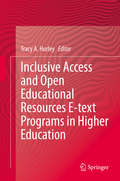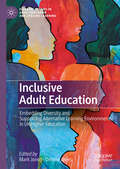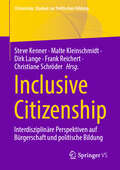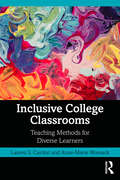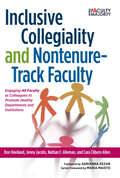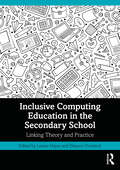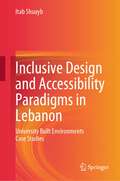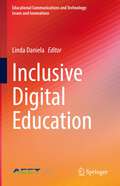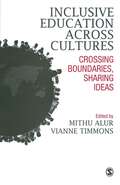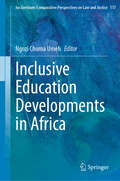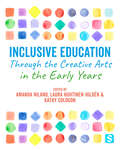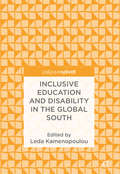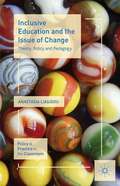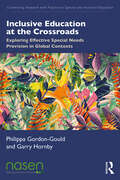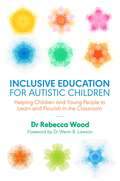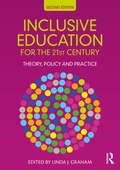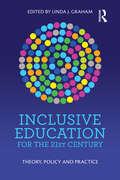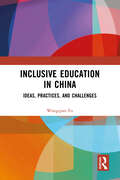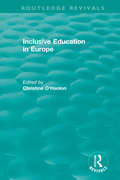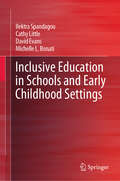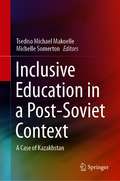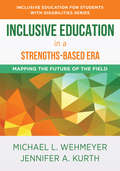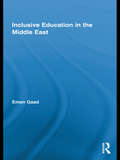- Table View
- List View
Inclusive Access and Open Educational Resources E-text Programs in Higher Education
by Tracy A. HurleyThis volume takes a comprehensive and broad look at e-text programs across a wide spectrum of programs, institutions, and policies in three parts. The first part showcases several policy papers to contextualize the discussion and highlight the reasons for IAE programs’ structure and the obstacles they face for implementation. The second part is an in-depth exploration of various case studies that provide a detailed description of IAE programs, including information about program elements, program structure, program size, and insights into how programs are operationalized, and their shortcomings and benefits to students and stakeholders. The final part is a selection of research papers that offer evidence-based support for the adoption of IAE programs in terms of student success, access, engagement, costs, and a variety of other student and institutional outcomes. There are approximately 300 institutions of higher education that currently have some form of Inclusive Access or Open Educational Resources E-text (IAE) program in the United States, but there is little scholarship that engages on the topic of assessing these programs’ effect on student success. The results of the research studies included in this volume will inform faculty, administrators, and policy-makers who seek to support the development, adoption, and implementation of IAE programs based on their potential positive effects on student success and other outcomes.
Inclusive Adult Education: Embedding Diversity and Supporting Alternative Learning Environments in UK Higher Education (Palgrave Studies in Adult Education and Lifelong Learning)
by Mark Jones Debbie JonesThis book offers critical discussion of developing inclusive theory, practice, and policy that supports the needs and experiences of adult learners within higher education settings in the UK. The first part of the book shares the research of authors, all who have lived experience of their area of expertise, and the experiences and needs of adult learners in relation to religion, ethnicity, gender, sexuality, and disability as well as including an intersectional lens. The second section of the book discusses practice and understandings of adults learners in non-conventional higher education settings within the police service, criminal justice, and health care. These contributions provide new knowledge to better support those from diverse backgrounds to thrive in the higher education environment. This book will be of interest to academics who teach/support adult learners, students of education, as well as practitioners who work outside traditional higher education settings such as community educators and policymakers.
Inclusive Citizenship: Interdisziplinäre Perspektiven auf Bürgerschaft und politische Bildung (Citizenship. Studien zur Politischen Bildung)
by Dirk Lange Malte Kleinschmidt Frank Reichert Steve Kenner Christiane SchröderInclusive Citizenship ist ein Konzept, das in diesem Band theoretisch und empirisch in den Blick genommen wird. Die Autor*innen betrachten Citizenship und Inklusion als soziale Praktiken aus verschiedenen Perspektiven und in verschiedenen gesellschaftlichen Feldern wie Gender und Migration, Lernen und Bildung, Digitalisierung, Medizin und Kulturerbe. Anhand von vielen empirischen Beispielen und theoretischen Impulsen wird so das Konzept geschärft, mit dem die inkludierenden und exkludierenden Aspekte von Citizenship ebenso in den Blick kommen wie die Dimensionen Status und Performativität.
Inclusive Classrooms: Video Cases on CD-ROM Activity and Learning Guide to accompany Exceptional Lives Special Education in Today's Schools
by Anne M. Bauer Stephen D. KroegerSkills and knowledge for creating inclusive classrooms.
Inclusive College Classrooms: Teaching Methods for Diverse Learners
by Lauren S. Cardon Anne-Marie WomackInclusive College Classrooms provides instructors with research-based practices and tools to create an effective and inclusive classroom environment. Filling a visible gap in pedagogical training, this important book responds to current barriers to inclusion in higher education by helping instructors improve the methods they are already using and identify new methods that could enhance their courses. The inclusive approach in this book is informed by critical pedagogy, universal design for learning, and intersectional social justice pedagogies. The authors identify practices in education that exclude historically marginalized groups and outline teaching strategies that can create more inclusive classrooms, where all students can feel heard and represented. This timely volume is packed full of hundreds of example lessons from across a range of disciplines, tips for moving classes online, questions to generate dialogue about various methods, and appendices on lesson planning. With this book in hand, instructors can continually adapt and revise their pedagogy to be more inclusive and effective.
Inclusive Collegiality and Nontenure-Track Faculty: Engaging <B>All Faculty</b> as Colleagues to Promote Healthy Departments and Institutions
by Jenny Jacobs Nathan F. Alleman Cara Cliburn Allen Don HavilandThis book focuses on the status and work of full-time non-tenure-track faculty (NTTF) whose ranks are increasing as tenure track faculty (TTF) make up a smaller percentage of the professoriate. NTTF experience highly uneven and conditional access to collegiality, are often excluded from decision-making spaces, and receive limited respect from their TTF colleagues because of outdated notions that link perceived expertise almost exclusively to scholarship. The result is often a sub-class of faculty marginalized in their departments, which reduces the inclusion of diverse voices in academic governance, professional relationships, and student learning. Given these implications, the authors ask, how can departments, institutions, and the profession do more to engage NTTF as full and active colleagues? The limited access of NTTF to the rights and responsibilities of collegiality harms institutional success in several ways. Given the full-time nature of their work and the heavy (but not exclusive) focus on instruction, NTTF are likely to be on campus as much or more than TTF, and thus be engaged with students, colleagues, and administrators in ways that more closely resemble TTF than part-time faculty. Their limited access to collegial spaces makes it harder for them to do their jobs by restricting access to information and input into decision-making. Moreover, since the greatest growth among women faculty and faculty of color is in NTTF roles, their exclusion from collegiality and decision-making negates the very diversity the profession claims to seek. Finally, colleges and universities face financial, curricular, and organizational challenges which require broad input, although the burden of governance is falling on fewer shoulders as the percentage of TTF declines and NTTF are excluded from these spaces.Ultimately, NTTF must be engaged as partners and colleagues in supporting institutional health. This book – the fruit of extensive data collection at two institutions over a five-year period – describes lessons learned from and benefits experienced by departments that have successfully supported and engaged NTTF as colleagues. Drawing on their research data and analysis of “healthy” departments that integrate NTTF, the authors identify the practices, policies, and approaches that support NTTF inclusion, shape a more positive workplace environment, improve morale, satisfaction, and commitment, and fully leverage the expertise of NTTF and the valuable human capital they represent. The authors argue that this more inclusive collegiality improves governance, supports institutional success, and serves diverse institutional missions. Though primarily addressed to institutional leaders, department chairs, tenure-line faculty, and leaders in the academic profession, it is hoped that the findings will be useful to NTTF who are engaged as advocates for and partners in the change process required to address the evolving structure of the university faculty.
Inclusive Computing Education in the Secondary School: Linking Theory and Practice
by Eleanor Overland Louise HayesUnderpinned by pedagogical practices and theories of what works in teaching computing, this book gives existing and new teachers ideas to enable them to plan an inclusive curriculum for the secondary school computing classroom. Computing is one of the fastest-developing subjects in the curriculum, and computing teachers will always be updating their subject knowledge and pedagogical approaches. Each chapter explores a specific aspect of inclusion and potential barriers faced by students and is designed to challenge teachers to think about their own practice and curriculum design. Themes include the influence of classroom environments, bias in the use of data, collaborative learning, building cultural capital, and racism within AI applications. The book is also laced with practical ideas to develop teaching shared by a wealth of experienced practitioners, researchers and industry professionals. Written with consideration for the National Curriculum for Computing, this valuable text will give trainee teachers, recently qualified teachers, and experienced teachers the confidence and knowledge they need to successfully deliver an inclusive computing curriculum in the classroom.
Inclusive Design and Accessibility Paradigms in Lebanon: University Built Environments Case Studies
by Itab ShuaybThis book describes the disability rights movement that started in the USA and its influence on the disability rights movement in Lebanon, which has led to the endorsement of the Lebanese Disability Act 220/2000. The book introduces the reader to the Lebanese Disability Act 220/ 2000, its definition of disability, and its relation to the medical and social models of disabilities and then articulate the Act articles. Then, it defines the inclusive design paradigm that acknowledges the needs of all people at each stage of their life cycle and presents the difference between inclusive design and accessibility and disability notions. Moreover, the book reviews the different international accessible design standards (American and French) that are adopted in Lebanon with the absence of a nationalized Lebanese design standard and its effect on eliminating barriers and enhancing accessibility at university buildings. Besides, the book presents students' experiences and their satisfaction with the university built environments. 6 university buildings case studies at the American University of Beirut are assessed and analysed to check whether they adopt the inclusive design approach and then propose inclusive design solutions for both heritage and modern university buildings. What makes the book unique is its combination of empirical and theoretical application of inclusive design. The last section, reflects the author’s inclusive design teaching pedagogy. In this section, the author shares samples of students’ class design project and provides recommendations and guidelines for teaching inclusive design so it becomes mainstream.
Inclusive Digital Education (Educational Communications and Technology: Issues and Innovations)
by Linda DanielaThis book is about the promotion and development of digital solutions for inclusive education, including a variety of hardware, software, digital learning materials, and digital learning content currently available on the market. All of these technological solutions serve as support materials and building blocks for inclusive learning environments but, at the same time, can involve hidden risks which may inadvertently create even greater gaps in inclusive education. This book provides strategies and methodologies that promote the development of opportunities for using digital technologies to support inclusive education. It provides an, understanding how to close the current digital gap while ensuring that the digital technologies selected do not support new risks of exclusion from the digital learning environment, strengthening and augmenting the already existing digital divide.
Inclusive Education Across Cultures: Crossing Boundaries, Sharing Ideas
by Mithu Alur Vianne TimmonsThis comprehensive collection provides a global perspective on inclusive education. The existing literature delves into whether inclusive practice is about educating children with disabilities or children from diverse backgrounds. The articles in this compilation assert that it is both. Inclusive Education Across Cultures: Crossing Boundaries, Sharing Ideas brings together multiple perspectives to present a compelling case for inclusive practice in different areas of inclusive education, ranging from policy initiatives to practices on the ground level, and advocating and creating awareness. The articles present examples that are explicitly disability-focussed and at the same time present a vision of inclusion that is about societal reform. These articles provide a voice to the people living with disabilities and enable us to learn from their stories. They not only provide theoretical information, but also connect theory and practice by discussing implemented models and practical resources. This work will be a valuable resource material for all those involved in the study of education, social work and psychology.
Inclusive Education Developments in Africa (Ius Gentium: Comparative Perspectives on Law and Justice #117)
by Ngozi Chuma UmehThis book contributes to the discourse on disability in Africa as an issue of systemic exclusion characterized by the discrimination and often complete segregation of persons with disabilities (PWDs) in various African countries. Despite the inclusive promise of the Convention on the Rights of Persons with Disabilities (CRPD) as well as the Protocol to the African Charter on Human and Peoples’ Rights on the Rights of Persons with Disabilities in Africa, the situation has not actually improved for PWDs in Africa. Given the powerful evidence of the devaluation of PWDs in connection with the COVID-19 pandemic, it is high time to reflect on the experiences of persons with disabilities in education, along with other forms of discrimination they encounter. The book’s respective chapters assess how well the existing legal frameworks, policies and practices in most African countries have met the needs for inclusion of children and adults with disabilities. The social and economic rights of persons with disabilities are protected in the constitutions of most countries and enshrined in the normative frameworks that most African leaders have adopted and ratified. These commitments need to be borne in mind when thinking about the present and the future. Inclusive development is an investment and must be viewed as part of a package of reforms that are connected to substantive social protection and improvements in realizing other socio-economic goods. Indeed, a range of alliances are needed to advance the goals of ‘leaving no one behind’, ensuring ‘education for all’, and delivering on the African Union’s call for the development of policies, programmes and requisite budgets for the realization of inclusive education for persons with disabilities.
Inclusive Education Through the Creative Arts in the Early Years
by Laura Huhtinen-Hildén Amanda Niland Kathy CologonThis book offers an engaging exploration of artistic expression in early childhood education. Through a blend of theory, research, and practical insights, the authors demonstrate the positive impact of the arts on fostering inclusion in various settings. Delving into creative modes such as dance, drama, and music, the book emphasizes the broader significance of integrating creativity into inclusive practices. Rich with illustrative case studies, thought-provoking prompts, and effective strategies for encouraging artistic expression, it serves as a valuable resource for early childhood students seeking comprehensive support in their educational journey.
Inclusive Education Through the Creative Arts in the Early Years
by Laura Huhtinen-Hildén Amanda Niland Kathy CologonThis book offers an engaging exploration of artistic expression in early childhood education. Through a blend of theory, research, and practical insights, the authors demonstrate the positive impact of the arts on fostering inclusion in various settings. Delving into creative modes such as dance, drama, and music, the book emphasizes the broader significance of integrating creativity into inclusive practices. Rich with illustrative case studies, thought-provoking prompts, and effective strategies for encouraging artistic expression, it serves as a valuable resource for early childhood students seeking comprehensive support in their educational journey.
Inclusive Education and Disability in the Global South
by Leda KamenopoulouThis edited volume examines inclusive education and disability in the global South. Presenting four qualitative research studies conducted in Malaysia, Bhutan, Philippines and Belize, the authors examine the implementation of inclusive education and disabled children’s participation in the education system: contexts on which very little is known. Thus, this book provides a unique opportunity to access rare context-specific information concerning this region of the world; and to reflect on the particular challenges some countries face in the realization of full participation of all children within education. Authored by researchers who are also teaching professionals with experience and understanding of the complexities of the real world, this book reminds us that researchers and policy makers must listen to all voices and perspectives: especially those that have remained silenced and ignored.
Inclusive Education and the Issue of Change
by Anastasia LiasidouThis book critically examines transformative change within the context of inclusive education policy and practice. Exploring the theoretical, policy and classroom (pedagogical) dimensions of the process of transformative change, this book documents the ways in which ideological presuppositions and professional practice should be transformed in order to meet learner diversity in effective and non-discriminatory ways. The distinctiveness of the book lies in its analytical approach, which aimsto blend diverse perspectives and disciplinary lenses to provide a comprehensive understanding of the ways in which transformative changes aligned with the tenets of an inclusive discourse can be theorized and enacted. The sheer complexity and interdependency of the perspectives underpinning the process of change, necessitates adopting a multiperspectival and multidisciplinary approach to theorizing educational change.
Inclusive Education at the Crossroads: Exploring Effective Special Needs Provision in Global Contexts (Connecting Research with Practice in Special and Inclusive Education)
by Garry Hornby Philippa Gordon-GouldInclusive Education at the Crossroads explores the short and long-term effectiveness of government plans to reform policy for special needs education, confronting difficult questions on policies about inclusion and suggesting alternative ways forward for achieving more effective education of children with special educational needs and disabilities (SEND).Inclusion has been a central concern for education systems globally for over three decades. However, has preoccupation with inclusion been at the expense of effective education for children with SEND? Where do policies for inclusion lead, and do they amount to the special education reform that is needed? What do the worldwide experiences of inclusion and special education reveal about how to improve the quality of education systems for all children in the future? How effective is the provision for children with SEND today? Through this informative and topical book, Gordon-Gould and Hornby shine an interrogating spotlight on current provision for SEND and ask if current legislation and policy inadvertently reinforce problems; if they cause many children with SEND to fall short of their potential, as well as preventing many schools from improving their levels of overall academic attainment. Inclusive Education at the Crossroads provides theory and research for teachers, school leaders, governors, policy makers, researchers, parents, post graduate students and anyone seeking practical solutions to meeting the needs of pupils with SEND in any global context. It will encourage open debate about the essence of educational inclusion in order to stimulate creative thinking among all stakeholders.
Inclusive Education for Autistic Children: Helping Children and Young People to Learn and Flourish in the Classroom
by Rebecca WoodThis book presents original, empirical research that reframes how educators should consider autism and educational inclusion. Rebecca Wood carefully unpicks common misapprehensions about autism and how autistic children learn, and reconsiders what inclusion can and should mean for autistic learners in school settings. Drawing on research and interwoven with comments from autistic child and adult contributors throughout, the book argues that inclusion will only work if the ways in which autistic children think, learn, communicate and exhibit their understanding are valued and supported. Such an approach will benefit both the learner and the whole classroom. Considering topics such as the sensory environment, support, learning and cognition, school curriculums, communication and socialisation, this much needed book offers ideas and insight that reflect the practical side of day-to-day teaching and learning, and shows how thinking differently about autism and inclusion will equip teachers to effectively improve teaching conditions for the whole school.
Inclusive Education for the 21st Century: Theory, Policy and Practice
by Linda J. GrahamThoroughly revised throughout, this bestselling book returns in a new edition to take an even more comprehensive look at the question: How can teachers and schools create genuinely inclusive classrooms that meet the needs of every student? Inclusive Education for the 21st Century provides a rigorous overview of the foundational principles of inclusive education and the barriers to access and participation. It explores evidence-based strategies to support diverse learners, including specific changes in curriculum, pedagogy and assessment practices, and the use of data. It addresses the needs of children with physical, sensory and intellectual disabilities, as well as those with complex learning profiles, including mental health issues. This second edition is rich with new content, including eleven new chapters which address learning from international experience, multi-tiered systems of support, leading inclusive education reform, the importance of language and supporting friendships. A new section has been added to provide explicit support for implementing systemic inclusive education reform from the policy level right through to classroom practice. A new series of podcasts, featuring interviews with expert chapter authors, offers an engaging complement to the chapter topics and content. With many schools still operating under twentieth-century models that disadvantage students, this book presents the deep knowledge, tools and strategies to better equip pre- and in-service teachers and leaders to make inclusive education a reality in all schools.
Inclusive Education for the 21st Century: Theory, policy and practice
by Linda J. GrahamPlacing a student on the autism spectrum in a busy classroom with a pair of noise-cancelling headphones and an aide to deal with the inevitable meltdowns is often done in the name of 'inclusion', but this is integration and not inclusive. How can teachers and schools create genuinely inclusive classrooms that meet the needs of every student?Research evidence indicates the strategies that make schools inclusive for students with disability benefit all students. Yet many schools are still operating under twentieth-century models that disadvantage students, especially those with disability. Inclusive Education for the 21st Century provides a rigorous overview of the foundational principles of inclusive education, and the barriers to access and participation. It explores evidence-based strategies to support diverse learners, including specific changes in curriculum, pedagogy and assessment practices, and the use of data. It addresses the needs of children with physical, sensory and intellectual disabilities, as well as those with complex learning profiles, including mental health issues.With chapters from leading experts from Australia and the UK, Inclusive Education for the 21st Century addresses common issues in both primary and secondary schools. Underpinned throughout by research evidence, it is designed to assist educators to develop the deep knowledge required to make inclusive education a reality in all schools.
Inclusive Education in China: Ideas, Practices, and Challenges
by Wangqian FuBy adopting a comparative approach, this book investigates the philosophy, policy, practices, and challenges of inclusive education in the Chinese contexts, recognizing influences of Chinese culture, such as Confucianism, collectivism, and familism. In the 1980s, the Chinese government promoted a policy named “Learning in Regular Classroom” to ensure educational rights for children with disabilities, which subsequently turned into an inclusive education program in the western sense. Starting from this point, the policy and practice of inclusive education have developed tremendously. To facilitate reflection and future development, this is the latest and most comprehensive attempt at understanding the status quo of inclusive education in China from a variety of perspectives: from early childhood to higher education, from family to schools and communities, from peers to teachers and parents. It also analyzed the unique Chinese philosophy of inclusive education, adding to current debates with a Chinese lens. This book will appeal to academics, students, and practitioners in disciplines such as education, early childhood studies, sociology, social work, social policy, disability studies, and youth studies.
Inclusive Education in Europe (Routledge Revivals)
by Christine O'HanlonOriginally published in 1995, this book offers a crucial view of the implementation of legislation for the integration of pupils with special educational needs in EU countries at the time. The match or mismatch between the rhetoric and reality, between the policy and the practice are reviewed by presenters from a recent appraisal of progress in individual national contexts. Authors are critical of the situation in their own countries and call upon recent and relevant research sources to support their views. The relationships between particular themes in the education of pupils with special needs are observed and compared in a broad European context.
Inclusive Education in Schools and Early Childhood Settings
by David Evans Ilektra Spandagou Cathy Little Michelle L. BonatiThis book provides a highly informative yet concise overview of special education and inclusive education that serves as a valuable introduction to the field. Using a framework and relevant scenarios in inclusive educational settings to help readers develop a basic understanding of key concepts, it shares effective practices and engages readers in discussions on current research. Further, it highlights the commonalities between different levels of education and explores transitions across them. The book addresses theory, policy, practice and research issues in special education and inclusive education from an Australian perspective, focusing on current developments in Australian educational settings and classrooms. It also examines international issues and developments while highlighting the unique characteristics of the Australian educational context. As such, it appeals to post-graduate students, pre-service teachers, teachers and other professionals in the area.
Inclusive Education in a Post-Soviet Context: A Case of Kazakhstan
by Tsediso Michael Makoelle Michelle SomertonThis book provides the first evidence-based reference about inclusive education in Kazakhstan, one of the post-Soviet Union countries. This nation, as well as many other central Asian countries, is undergoing a radical transformation and change in education which encompasses the implementation of inclusive and special education. This book is composed of chapters synthesized from various studies and captures different aspects of the implementation of inclusive education in Kazakhstan.The implementations of inclusive education in any educational system require a multi-dimensional, multi-level and an integrated approach. It requires collaborative efforts on part of all stakeholders including governance, pedagogical, auxiliary and support structures. This book is a collection of evidence-based studies in a Kazakhstani educational context that demonstrates the multifaceted nature of the process to realize an educational system that is inclusive. The book highlights some of the fundamental requirements and challenges for this process to succeed.Among the main issues addressed in this book are the understanding of inclusive education, the transition towards inclusive education given the soviet legacy, the role of school leadership, teachers, parents and other stakeholders in the process. The findings in each chapter demonstrate some of the milestones and challenges of inclusivity. This work will be of interest to academics, scholars, students and teachers in this field.
Inclusive Education in a Strengths-Based Era: Mapping the Future of the Field (Inclusive Education for Students with Disabilities #0)
by Michael L. Wehmeyer Jennifer KurthIt’s time to focus on what students can do, rather than what they can’t. In this inaugural book in their Inclusive Education for Students with Disabilities series, Michael L. Wehmeyer and Jennifer A. Kurth explore central, defining questions for the field of special and inclusive education: who, what, and where do we teach; what works in inclusive education; and where does inclusive education go now? Arguing that the concept of disability for the past fifty years has emphasized students as incapable and incompetent, the authors propose instead to build on a growing understanding that students with disabilities can be successful and meet high expectations, and that educators have the knowledge and skills to achieve this. From this strength-based perspective, the presumption is that disability is part of, and not apart from, typical human functioning. Using this lens, Wehmeyer and Kurth describe effective practices to guide instruction in inclusive settings—practices that begin with a consideration of each student’s strengths and capacities, rather than with a diagnosis.
Inclusive Education in the Middle East (Routledge Research in Education)
by Eman GaadThe potential of adopting inclusive education to support learning for all is an international phenomenon that is finding its way to the Middle East and the Arabian region. Eman Gaad examines the current status of inclusive education in Arabia and the Middle East through an assessment of the latest international, regional, and local research into inclusive education. With a focus on the more complex areas of related cultural practice and attitudes towards inclusive education in this dynamic and fast-changing part of the world, Gaad offers a research-based analysis of the current educational status of the Arabian Gulf and some Middle Eastern countries that adopted inclusive practice in education, and others that are yet to follow. This book will be of great interest to students, academics, teachers, and therapists in the field of comparative and inclusive education as well as those with an interest in policies of education in the dynamic and culturally distinguished Middle Eastern Arabian region.
